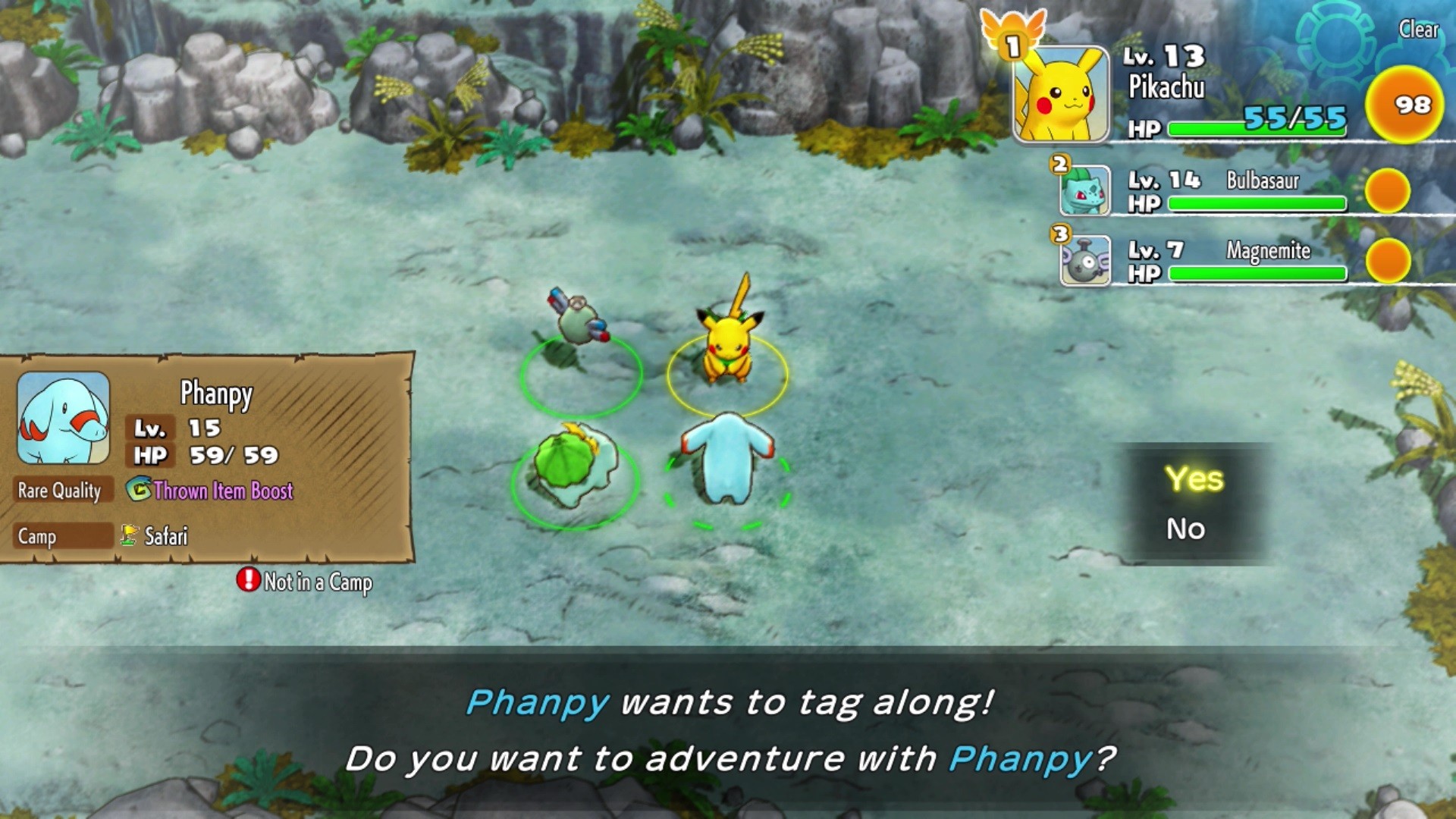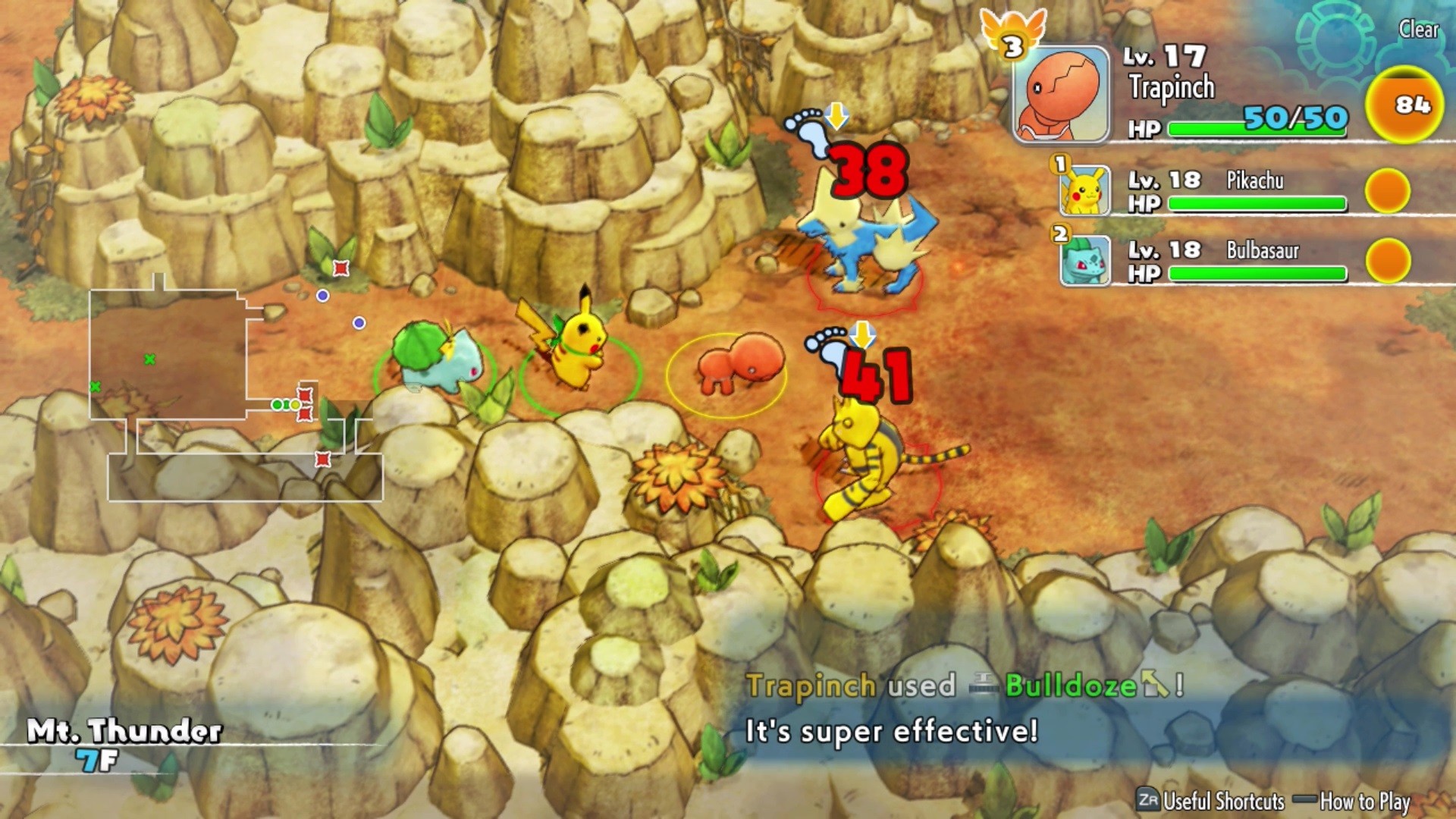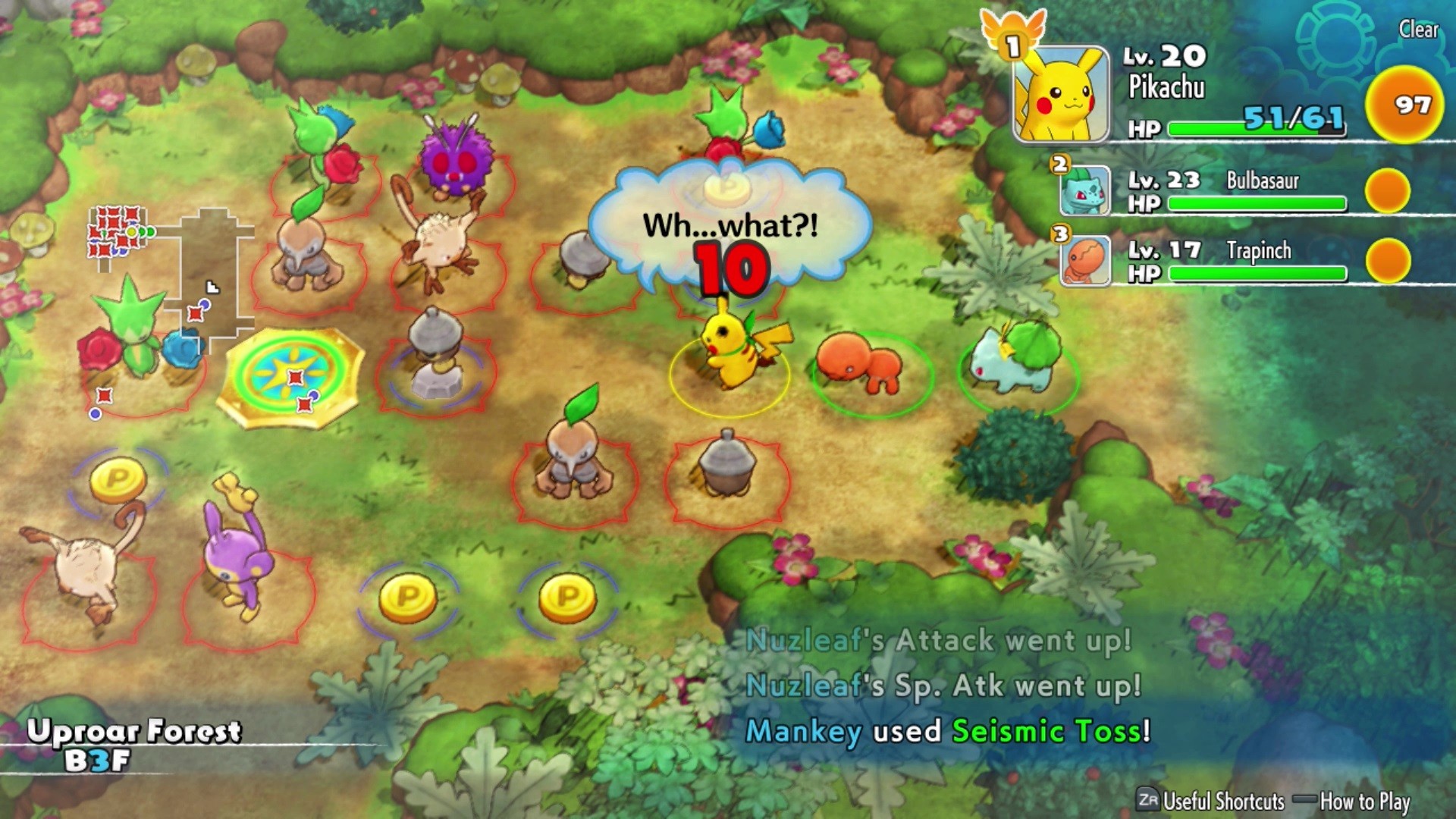 When it comes to Pokemon games, there is a very, very dangerous contingency of fans who will refuse to acknowledge or even listen to anyone speak about a game that isn’t considered a core game. Pokemon GO isn’t “real Pokemon”. Pokemon Shuffle is “a massive waste of time”. Lots of fans don’t even want to touch on Let’s Go Pikachu/Eevee because it’s considered too easy and a soft game that’s for children and not for those hardcore Pokemon trainers. But there is a certain amount of space made and considered for the Mystery Dungeon series. These games, believe it or not, take an already existing game type and expand upon the concept by injecting in all that’s great about Pokemon battling AND adding a seriously complex and unique storyline. Fans have been patient and crossed fingers and toes every year for a new game since the last instalment, Super Mystery Dungeon, came out close to four and a half years ago, but there’s been neither hide nor hair. Now, as we wait patiently for the launch of the Expansion Pass for Pokemon Sword and Shield, players have been rewarded with…a remake. Still, if you’ve gotta remake a game, tackling the very first Mystery Dungeon and giving it an overhaul was a damn good place to start.
When it comes to Pokemon games, there is a very, very dangerous contingency of fans who will refuse to acknowledge or even listen to anyone speak about a game that isn’t considered a core game. Pokemon GO isn’t “real Pokemon”. Pokemon Shuffle is “a massive waste of time”. Lots of fans don’t even want to touch on Let’s Go Pikachu/Eevee because it’s considered too easy and a soft game that’s for children and not for those hardcore Pokemon trainers. But there is a certain amount of space made and considered for the Mystery Dungeon series. These games, believe it or not, take an already existing game type and expand upon the concept by injecting in all that’s great about Pokemon battling AND adding a seriously complex and unique storyline. Fans have been patient and crossed fingers and toes every year for a new game since the last instalment, Super Mystery Dungeon, came out close to four and a half years ago, but there’s been neither hide nor hair. Now, as we wait patiently for the launch of the Expansion Pass for Pokemon Sword and Shield, players have been rewarded with…a remake. Still, if you’ve gotta remake a game, tackling the very first Mystery Dungeon and giving it an overhaul was a damn good place to start.
Pokemon Mystery Dungeon: Rescue Team DX is a re-imaging of the original Red and Blue Rescue Teams that were released for the GBA and the DS, respectively. The story for both titles was the same, and it carries true here in the Nintendo Switch remake. You are a human that has, through some kind of magic, been transformed into a Pokemon. Which one you are is determined by a personality test at the beginning (though you can honestly just decide which one you want if the chosen Pokemon isn’t ideal). You then get to choose your partner Pokemon, who is your number one best friend, confidant and lifeline in each and every mission. You awaken with no memory of who you were (other than a chosen name) and no idea how you became a Pokemon. Your partner Pokemon (in my case, a Torchic named Tumeric) doesn’t really care, but they are quite keen on helping you out and forming a lasting bond. Shortly, you both decide to create a Rescue Team: a recruitable squad of Pokemon that will handle any sort of mission thrown at them, from exploration to rescue, escort to delivery. Naturally, you shortly find out something is up in this mysterious land that’s making Pokemon act weird (rescue squads don’t usually have to combat other Pokemon), and it’s even affecting the legendary birds who inhabit nature! Will you and your partner get to the bottom of these mysteries, and, the biggest mystery of all, how you became a Pokemon? I mean, yea, of course, as long as you play all the way through.
Pokemon Mystery Dungeon: Rescue Team DX is a mystery dungeon game first and a Pokemon game second. You explore procedurally generated floors in set landscapes, encountering Pokemon, items, traps and other such things. You move in a grid fashion and attack as such, trying to find your way to the stairs to lead to the next floor. Usually, when entering dungeons, you have a mission or two in mind, and are given the opportunity to leave upon completion of said missions. However, you also can just enter dungeons and see how far you can get to either hunt for rare treasure or do battle with an especially large and interesting Pokemon. You see, there’s a chance, while battling, that a Pokemon will be so impressed with how you kicked their butts that they want to join your team. They then hang around with your party until you find the exit, at which point they might join your team IF you’ve added the proper terrain camp to your rescue base. After all, a Seel needs a watery locale quite different from the fiery homestead where Magmars might reside.
For a lot of players, Rescue Team DX scratches an important itch by balancing two very different worlds with great success. Firstly, as a mystery dungeon game, you have so many strategic ideas that you don’t normally contend with in a Pokemon game. The question of hunger and a limited inventory is a big one, and you always have to make room and plan ahead with things to eat to prevent starving and fainting on a far distant floor. Movement of your own character and that of your assistant squad members (you can make squads of three, though you and your partner must always be present for story-missions) are carefully planned and measured, as you need to allocate for potential traps, enemies with ranged attacks, and deciding whether or not to go out of your way to get potential bonus goodies. You’ve got one apple left, is it worth reviving a fainted Doduo that you found on the eighth floor, or save it so you don’t drop dead if this cavern continues much longer? The exploration and planning is a ton of fun, as is mixing in non-Pokemon elements like hurling stones and orbs at enemies, or casting spells with staves that you might find along the way. All of this is well mapped to the Nintendo Switch, which mercifully has more buttons than the GBA or DS did AND allows for touchscreen input for certain things (like typing in names or certain codes).
Rescue Team DX also carries a lot of Pokemon power behind it as well. Sure, you’ve got Pokemon to find, but you also have standard game mechanics from the core series to wonder about. You need to make calls about changing moves as you level up, which is harder with the way skills are handled in terms of skill level up. Sure, Hydro Pump is more powerful than Bubble Beam, but you’ve been using Bubble Beam for so many missions now it has accuracy and critical bonuses: do you really want to swap it out and risk it? Also, you’re trying to recruit (catch) all the Pokemon that exist in this world, which means re-entering dungeons again and again to see if they will a.) spawn and b.) want to join you. These Pokemon may also have rare abilities that can aid you severely in your journey, plus shinies are a thing in this game too (gotta get that bright blue Rapidash!) PLUS the Mega Evolutions exist, giving you insane power and options for building the most OP Rescue Team in existence. Additionally, unlike recent Pokemon core games, Rescue Mission DX has a fantastic amount of post-game play, allowing you to run specialty missions and finding even more rare items and places to explore once you save the world.
Pokemon Mystery Dungeon: Rescue Team DX boasts a few special goodies as a remake (besides the Mega Evolutions), but the two biggest are the artwork upgrade and the automode. The artwork is more of a watercolor approach, giving everything a more whimsical and idyllic portrayal, and it’s honestly just a joy to behold on the Switch’s screen. You get a feeling of being within a Pokemon’s world, instead of being a human trainer who is living while Pokemon are generally around. From the lush and cheery woods to the desolate mountaintops, the already well flushed out game gets a serious boost from fantastic design and boost to the appearance, and it doesn’t suffer by alienating or antiquating the other Mystery Dungeon titles. I could seriously just play this for hours and occasionally press the minus button to make text disappear so I can “Admire” the artwork. Very cool, Nintendo.
The automode…is for someone. It’s not for me. Mystery Dungeon already had buttons to make your Pokemon run through tunnels faster, and you have configuration control to decide if your fellow squad members will be aggressive, exploratory, defensive or whatever. Automode is basically a toggle that says “I don’t feel like exploring, you do it.” It’s not so generous that it also automatically eats and fights for you, but it takes the reigns away and just drives around, bringing you to items and the exit without needing to think about it. I think it’s like the autodrive controls on Mario Kart: they’re great for young players who want to feel like they’re doing a good job but actually aren’t. If you enjoy automode and use it as the best way to get around, fair enough, have a great time, but it felt too alien for me, taking away the difficulty in a game that already allowed for notification about damage, plenty of opportunities to get apples and not the hardest boss approaches. It just didn’t feel right.
Oh, my one serious complaint are the rescue mails. If you faint in a dungeon, you can either lose all the cash you had on hand and some items and get sent back to town, or you can ask other players to come and save you. Great concept, right? Except for the rescue mail codes are ridiculously long and complicated. It’s a mixture of numbers and letters on top of having five different unique fonts to intermix, and it’s just a pain to enter. There had to have been a better way. I don’t know what it is, but children are going to lose their minds trying to save friends when they need to use an Enigma machine to get the code right.
Having said that, Pokemon Mystery Dungeon: Rescue Team DX was a smart creation and investment for the Switch. It buffs up the original, which has my favorite story (still teared up at the end!), and allows Nintendo to test the waters without sinking all their resources into a single game. With the Pokemon count now being somewhere close to 1000, it made more sense to keep closer to the core, add a couple of bonus bells and whistles and see how it landed. I think the result was spectacular, and is already eating up my free moments with “just one more floor” and “goddammit where is an apple?!” We all have heroes inside of us: which one will you awaken?
REVIEW CODE: A complimentary Nintendo Switch code was provided to Bonus Stage for this review. Please send all review code enquiries to press@4gn.co.uk.
Subscribe to our mailing list
Get the latest game reviews, news, features, and more straight to your inbox
Thank you for subscribing to Bonus Stage.
Something went wrong.
Pokémon Mystery Dungeon: Rescue Team DX Review
-
Gameplay - 9/10
9/10
-
Graphics - 9/10
9/10
-
Sound - 9/10
9/10
-
Replay Value - 9/10
9/10
User Review
( votes)Overall
Summary
A Pokemon game that doesn’t play like a Pokemon game and lets me throw rocks at Weedles: sign me up!





